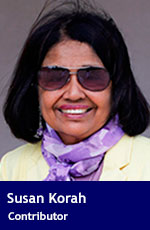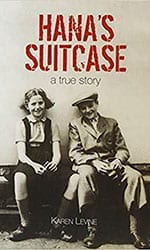 Hana Brady could be another Anne Frank except she did not leave a diary.
Hana Brady could be another Anne Frank except she did not leave a diary.
But the suitcase that 13-year-old left behind when she died in a gas chamber at Auschwitz concentration camp continues to teach millions of children around the world the importance of respect, empathy and compassion. It bears silent witness to the agony of the six million Jews who perished at the hands of the Nazis in the genocidal campaign known to the world as the Holocaust.
Hana Brady, born on May 16, 1931 in Prague in what was then called Czechoslovakia, was one of the 1.6 million Jewish children who died in the Holocaust.
Reading Time: 5 minutes
“The suitcase brings alive the story of the Holocaust, and through it kids in Canada and around the world can relate to Hana as a person,” Lara Brady, Hana’s niece said from her home in Toronto.
In a telephone interview, she emphasized the special significance for her and her family of January 27, designated International Holocaust Remembrance Day by the UN.
“In the past, we’ve attended (Holocaust Remembrance) ceremonies but this year – like everyone else – we’ll be honouring the day online. It’s so important to commemorate history and honour the memory of those lost —as well as those who lived and chose to make the world a better place,” Lara said.
The story of the suitcase and how it came to play a central role in the way Lara and her father George Brady honour the legacy of his sister Hana, began with an unexpected connection, which later blossomed into a friendship. It was when they crossed paths with Fumiko Ishioka, a Japanese librarian and educator, who currently serves as the executive director of Holocaust Education Centre in Tokyo.
FROM THE ARCHIVES: Canada helps preserve memory of Holocaust by buying Hitler’s book by Michael Taube
Unknown to George and Lara Brady, Ishioka had tracked down the suitcase Hana left behind at Auschwitz, and was searching diligently for information on the owner.
In response to the librarian’s request for artifacts to help her illustrate lessons for young people on the Holocaust, the Auschwitz museum loaned her the suitcase which had belonged to Hana. But information on Hana herself was sparse, and finding details to piece together her life story proved to be a nearly insurmountable challenge. However, Ishioka’s determination and persistence paid off, and her search led to an address in Toronto.
George Brady, who had survived the ordeals of the same camp where his sister died, had emigrated to Canada, built a new life for himself, and was raising his children.
George and his Toronto-born daughter, Lara, were intrigued when one day, out of the blue, they received a letter from Ishioka, asking about Hana and what had become of her. Ishioka’s quest for information had led her to a friend of Brady’s, who in turn informed her that George lived in Toronto.
An invitation to Tokyo followed, and during the March break of 2001, when Lara was in her final year of high school, she and George travelled to Japan. It proved to be an exciting and rewarding trip – the first of many speaking engagements across the country and around the world, where they told rapt audiences of children about the horrors of the Holocaust and what they could do to prevent it from ever happening again.
“As we told them (Japanese school children) about the suitcase and Hana’s life, they were transfixed. They could relate to Hana, and what she could have been, if she had lived to be an adult and had fulfilled her dreams,” Lara said.
“Children are not powerless,” she added. “They don’t have to wait to be the leaders of tomorrow. They can take steps to address issues of racism and injustice in their own day-to-day lives.”
 A children’s book called Hana’s Suitcase by Canadian writer Karen Levine published in 2002 deftly weaves together the threads of the multi-stranded story – the finding of the suitcase, Ishioka’s search for information that took her across the world, and the Holocaust experiences of Hana and George Brady.
A children’s book called Hana’s Suitcase by Canadian writer Karen Levine published in 2002 deftly weaves together the threads of the multi-stranded story – the finding of the suitcase, Ishioka’s search for information that took her across the world, and the Holocaust experiences of Hana and George Brady.
George Brady passed away at age 90 on January 11, 2019 after a life that exemplified survival, resistance, resilience and triumph over unimaginable personal tragedy. Liberation from hatred was another theme that helped him lead a life of purpose and activism.
The Canadian Jewish News of February 11, 2013 quoted George as saying: “The hatred has to stop somewhere.”
Brady’s life’s work received a remarkable recognition when the German Federal President awarded him the Order of Merit for his “outstanding engagement for tolerance and reconciliation,” years after the Nazis had perpetrated their atrocities.
“It was a great honor and joy for me to pin it to George’s lapel on his 85th birthday” Sabine Sparwasser, Ambassador of the Federal Republic of Germany told me in an e-mail exchange. She was Germany’s consul-general in Toronto at the time.
“Over the years, George, his wife Teresa and daughter Lara became dear friends to me and my family. When George died, I dedicated a concert and reading evening to his memory,” Sparwasser said.
The German ambassador shared another anecdote that illustrated how “the light of humanism had been lit in one of the darkest places on earth”: the Terezin concentration camp (now in the Czech Republic) where George had been incarcerated before being transferred o Auschwitz.
She said that George’s mentor at Terezin was a “born educator” called Valtr Eisinger who had encouraged George and his friends to imagine an ideal world where human rights were respected, religion and nationality did not matter, and everybody had a voice and a place. They called it the Republic of Shkid.
She added that Valtr died on a death march, but survivors like George carried the light he lit to the outside world.
Today, George’s daughter Lara holds that torch aloft. Undeterred even by the pandemic, she continues the Holocaust education program that she and her father provided to millions of children, and which Fumiko Ishioka enriched with her discovery of Hana’s suitcase.
“The Brady family celebrates in particular how lucky we are to have George as our patriarch — and also our wider amazing community of survivor friends who showed us how to lead lives of meaning and activism by example.” Lara said.
“The particularly sweet day for us personally is January 21 since it marks when my father was liberated from the death march. This will be the first year that we don’t celebrate with a big family dinner! We’ll still light memorial candles and remember, but we look forward to next year when we can celebrate together.”
Susan Korah is an Ottawa-based journalist.
This commentary first appeared in Convivium, published by Cardus, a leading think tank and registered charity. Convivium is a Troy Media Editorial Content Provider Partner.
Susan is one of our Thought Leaders. Why aren’t you?
For interview requests, click here. You must be a Troy Media Marketplace media subscriber to access our Sourcebook.
The views, opinions and positions expressed by columnists and contributors are the author’s alone. They do not inherently or expressly reflect the views, opinions and/or positions of our publication.
